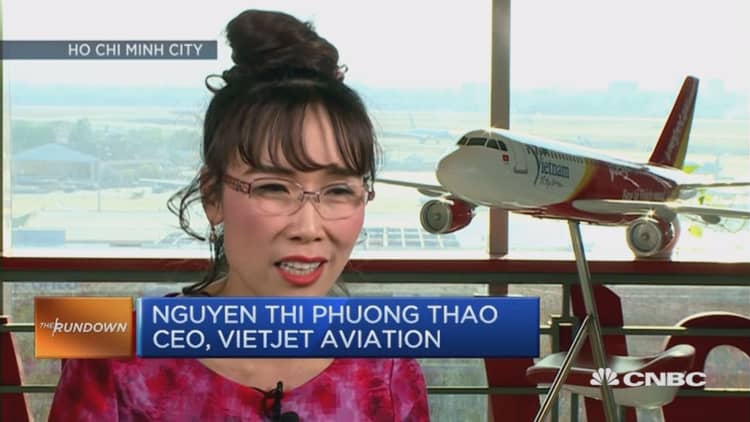
Nguyen Thi Phuong Thao is a petite woman with a tendency to smile sweetly as she answers questions in a soft voice. But don't be fooled - she is no pushover.
As founder and chief executive of VietJet, she has grown Vietnam's only private low-cost carrier (LCC) so quickly that, less than five years after opening for business, its passenger volume is on track to surpass that of Vietnam Airlines, the country's national carrier.
Smart, decisive Thao explains that she is a feverish researcher.
"When my first son was only a few months old, I started to research the low cost carrier space," the 45-year old recalls. "Then I spent the next 10 years researching aviation, meeting the CEOs of different LCC's like Jetstar, Air Asia and Southwest Airlines."
The airline industry was a fairly new field for Thao, who had made her fortune in Vietnamese real estate.
Her secret to success: research and timing. In the years leading up to VietJet's first flight in December 2011, there was no independent low-cost carrier in Vietnam. The middle class was growing and the Communist government was opening up the aviation sector to competition.
Getting a boost from bikinis
Thao's also unafraid of courting attention and controversy.
In 2012, the new airline generated sizzling media coverage by staffing its flights with bikini-clad attendants. Those bikini flights no longer run but that doesn't mean they won't return.
"If a beautiful image helps our customers feel happy, we will always try our best," Thao says.
Addressing criticism the bikinis were a gimmick that objectified women, she says, "In this world, there are a lot of beauty contests where the contestants wear bikinis in the competition. The bikini shows beautiful characteristics. Our message at VietJet is we did this for the benefit of beauty and happiness."
Talk of an IPO
VietJet's bread and butter is the domestic market. It currently flies 34 domestic routes and 16 international routes, including flights to Singapore, Thailand and Myanmar.
And with ambitious expansion plans, VietJet is reportedly planning to float this year.
Thao will not confirm how much money will be raised in an inital public offering (IPO) nor the percentage of the company that will be floated but will say her plan is to expand internationally into North Asia and Northeast Asia, to new destinations five to six hours from Vietnam. That includes possible routes to China, Russia and Japan (Tokyo, Nagoya, Fukuoka).
"They're very ambitious. So far, they've focused on the domestic market. Domestic is the easiest, low-hanging fruit, " says Brendan Sobie, chief analyst at Centre for Asia Pacific Aviation.
"Now, they're reaching the point where they're completing that first phase. If they want to keep up with the rate of growth, they need to do more international, which is more challenging. It's more risky. They'll have to rely on inbound or transit traffic. They have a harder part of the business to crack."
The IPO would help carry out VietJet's plan to increase its 2016 fleet from thirty-six A320 and A321 planes to forty-five. The airline also wants to add two more domestic routes and 18 additional international routes.
Will they succeed? "If they make the right decisions and are not overly ambitious, yes, they can succeed," says Sobie. "They have to do it at a pace that's reasonable."
Building the 'Emirates of Asia'
Thao openly admires the track record of Dubai-based Emirates Airline and sets her sights on turning VietJet into the "Emirates of Asia."
"They have a global vision. Emirates is the airline of a small country that wants to conquer the world," Thao says.
Thao acknowledges that to conquer the world would mean moving away from the low-cost carrier model but believes she can succeed without losing her core, price-sensitive customer base.
"We can build up our cost-effectiveness and provide high-end service," she says. "VietJet is confident in its service quality, it's not inferior to other carriers in the world."
Thao points to in-flight means meals as an example of VietJet's skill in cost-effectiveness. She says a hot meal on a Ho Chi Minh City -Singapore flight costs $3 on VietJet compared to the $10 she says other carriers would charge.
"That's why we don't consider ourselves a normal low-cost carrier," she said. "We consider ourselves a hybrid airline or a new age carrier."




